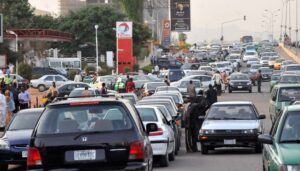- By Safiu Kehinde
• Decries panic buying by consumers
• Disclaims shortage in supply
Nigeria National Petroleum Corporation’s (NNPC) Group Chief Executive Officer, Mele Kyari, has lamented over the greediness of stakeholders within the distribution chain of petroleum as fuel scarcity persists across the country.
Speaking earlier today at the Good Morning Nigeria program aired by Nigeria Television Authority (NTA), the NNPC boss claimed there is abundant supply of Petroleum Motor Spirit (PMS) while identifying the distribution channel as the major problem facing the sector.
While admitting that the NNPC is partly responsible for the fuel scarcity, Kyari alleged that the distribution chain is majorly responsible for the scarcity on account of the greediness of key players in the segment.
“For NNPC, we do not want to absorb ourselves. We are part of this value chain and we take part of the responsibility for this. We understand the frustration of Nigerians. We also understand the fact that when fuel is mentioned, it is always NNPC that everybody remember.
“We do not own all the trucks in the country; we don’t own all the fuel stations, and we don’t own all the fuel depot’s in the country. Aside that, there are other scanty issues associated with this- managing the road; making sure the roads are accessible. So many of these things we do intervene. But we know our limitations. There are things that we escalate and there are things we do engage ourselves directly.
READ ALSO:
- Inter Milan Strikes 4-years deals with 18-year old Remo Stars Prodigy
- Pope Francis in DR Congo: A Million Celebrate Kinshasa Mass
- Unending Fuel Scarcity Puts Elections At Risks- INEC
“But it is a chain of relationship. It is a chain of engagement. We take responsibility-no doubt about it. We are the single point of communication for this and we understand this perfectly. But the reality today is that there are number of things happening.

“There is greed across the value chain all the way from the depot’s, to the fuel stations, to the trucks, and to those people you meet on the road. I am sure you are very aware that as you move products from location to location, so many fees are paid-local government, state government, and all manners of collection. They add up to the logistics challenge.” He said.
Prior to this, Kyari had revealed that the cause of fuel scarcity can be traced to the distribution channel, stressing that transportation cost and problems such as poor road network, accident, and insecurity contributed to the high cost of logistics which hinders adequate distribution of the fuel.
“We do not have a supply problem at all because as we speak now, we have over 28 days of supply even if we evacuate 60 million litres of PMS everyday.
“The problem we have is distribution problem. This distribution problem comes up as a result of realities that happens. First of all, there are shifts in the market in terms of the logistics cost of our business- taking products from the mother vessels into the terminals and from the terminals all the way into the trucks to the fuel stations. Several things change and we do not have an automatic adjust system.
“For you to meet the 60 million litres plus the demand level in the country today, you need to have over 1700 to 1800 trucks everyday on the road. For you to do this consistently, that means you have to load 1700 plus trucks everyday on a continuous basis. And some of these trucks do take up to seven days to get to their final destination and maybe another seven days to return.
“You can see that you have, in multiplication, thousands of trucks running in this country. And once you have a minor glitch- issues around road, accidents, you will just see these trucks getting stuck. They cannot reach their destinations and this glitch now becomes a major problem.” Kyari said
While the NNPC boss disclaimed the scarcity of fuel, he identified the panic buying of fuel by as the major cause of long queue at the fueling station, stressing that people tend to buy more than they are require.
“And for an ordinary consumer, it is so very obvious that when people see three, four cars at a fuel station, they will naturally rush in. When your need is just ten litres and you see a queue of ten cars, you will say let me fill up my tank. Instead of you spending two minutes in the fuel station, you will end up spending ten minutes and you will see the queue spreading irrespective of whether you have product in the fuel station.
“This is what we call panic buying. It doesn’t mean people are afraid. Rather, it means people but more than what they are required. And as such, you have to add more and more supply beyond what they need to make sure that the panic is eliminated and that’s why you see the queues in the country. There is no scarcity of fuel, but there is clearly issues around people responding to the realities we are facing today.” He said.


